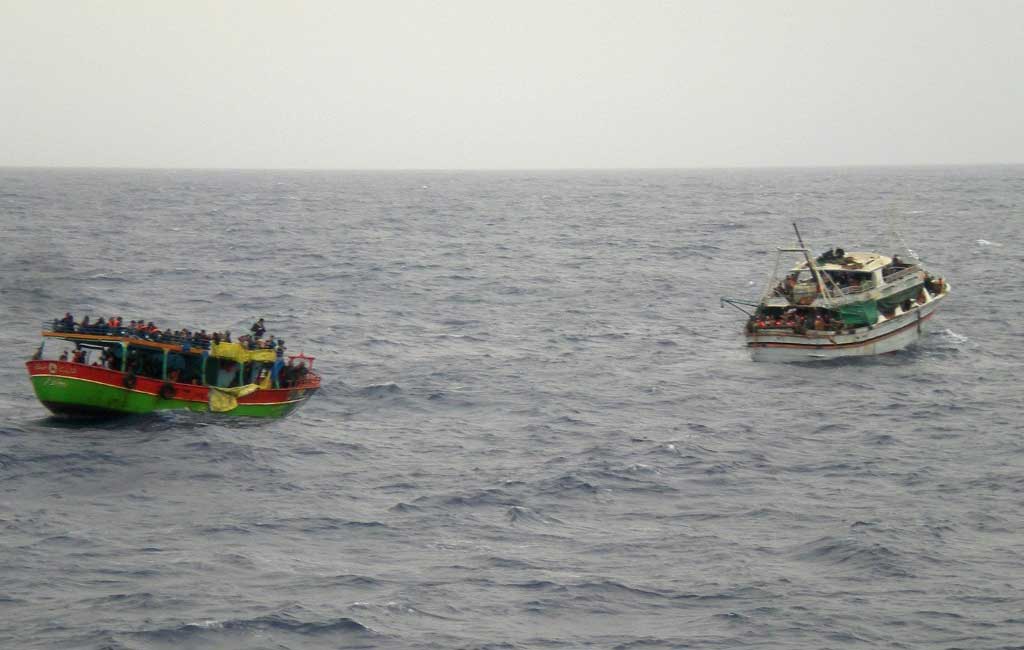Bangladesh’s fatal obsession with the European dream
The siren song of Pax Europa remains irresistible for a crucial reason ahead of all others – it takes only a little over Tk2 lakh paid to human traffickers, to get to Europe
A passage to Europe is the holy grail of countless aspiring Bangladeshi migrants. Lucrative working conditions and humane immigration laws have drawn millions of migrants towards the Old World, albeit lethally. The conflicts in Iraq, Libya, Syria, Somalia, and Yemen, and several other countries, have led a shift of not only their native population, but also migrant workers there.
Over the past few years, Bangladeshis who were working in the Middle East have been relentlessly attempting to cross the Mediterranean in dire conditions, seeking a better life and fleeing uncertainty and despair. Many of these attempts result in deaths.
In 2019, the Bangladesh government brought back the dead bodies of 4,036 from various countries, many from the Middle East. Between 2005 and 2018, a staggering 33,112 deceased migrants were repatriated.
In 2016 alone, 34,000 illegal immigrants from South Asia tried to cross the Mediterranean to Europe. Italian authorities registered 8,131 Bangladeshi citizens as having arrived by unconventional means. In the first 100 days of 2017, the same authorities found 4,645 Bangladeshis at their landing ports.
The siren song of Pax Europa remains irresistible for a crucial reason ahead of all others – it takes only a little over Tk2 lakh paid to human traffickers, to get to Europe.
It takes a village
Alal Mia was living in Oman. His family in Sunamganj sold off what little land they had to send him abroad so he could earn more money and lift them out of poverty. But his life in Oman hardly changed their fate. He would send very little money every month, when and if he could send any money at all.
This was how it was for 12 years until he called his family last November.
“I am in a lot of trouble in Muscat. I cannot earn enough to deal with it. If you can send Tk2.15 lakh to a broker, he can help get me to Europe where I can earn more money and finally improve our lives!”
But when Alal set sail for Antium on December 26, rogue waves sank his boat, and the dreams of his family drowned with Alal on the western shores of Byzantium.
Turkish authorities reported that four of the seven people who died were Bangladeshis and that the 64 rescued passengers were an assortment of Bangladeshis, Afghans, and Pakistanis. After a month, Alal’s body arrived in Bangladesh.
Dreams, deception, and death
Syed Faisal Ahmed and 15 other Bangladeshis were part of a group of 50 who crossed into Iran illegally on a boat across the Gulf of Oman in the dead of night, trekked across the desert on only dry foods and occasionally riding a vehicle, finally arriving at the Iran-Turkey border after three days.
He had lived for nine years in Muscat, Oman. He had a daughter, a son, and a wife waiting for him in Sylhet’s Balaganj. His brother Sharif had spoken numerous times with the Bangladeshi broker in Muscat who assured him that Faisal could go to Europe via Iran and Turkey without any hassle.
“I sent him Tk30,000 initially. When he successfully sent my brother to Iran, I sent another Tk2.3 lakh for the journey to Europe. We spoke to Faisal every day on the broker’s phone. After they reached Europe, the broker asked for another 2,000 euros. We were shocked, because this was not mentioned before and we had given them what we had. There was a lot of negotiation but we relented.
“Soon they cut off all communications one day and after a few days I learned that my brother was dead. I cannot identify who these people disguised as brokers are, but I request that government authorities track them down and stop them from exploiting desperate people like us.”
The government’s take
The Wage Earners’ Welfare Board (WEWB), a government organization that looks after Bangladeshi workers abroad, said it had brought back the dead bodies of 4,036 migrant workers in 2019 from various countries except Turkey, because Bangladeshi workers are not sent to Turkey. The authorities said illegal migrants to Europe via Turkey do not count as expatriate workers and when they are detained or die, they have to be repatriated by themselves or their families.
The Bangladesh government’s expatriate security policy stipulates that Middle Eastern countries are required to inform Bangladesh when they detain any Bangladeshi citizens. The police then work to verify their identities.
Sohel Rana, assistant inspector general (Media) of Bangladesh Police, said the first thing the illegals do when they reach Turkey or other countries is to ditch their passports. Often the information on the passport is wrong, making it harder to verify their identities.
Police and embassy officials said there are two distinct trafficking patterns. One approaches Bangladeshis working in the Middle East to lure them to Europe, another approaches desperate youth in Bangladesh to take them to Europe via Turkey or Libya.
The Bangladesh Embassy in Turkey said the current Turkish government raised security at the border with Europe in 2016 after it signed a treaty with the European Union to regulate illegal migration.
M Allama Siddiki, the Bangladesh ambassador to Turkey told Dhaka Tribune that there are at least 350 Bangladeshis in Turkish prisons for illegal trespassing by human trafficking. He strongly advocated against illegal migration.
The most urgent question on the mind of any detaining authority is whether the person is a member of the Islamic State or any other illegal organization. The verification takes up to three months, and often detainees are released only when the detention centers are overflowing.
But upon release, the migrants attempt to make the crossing yet again to Greece or Italy.

